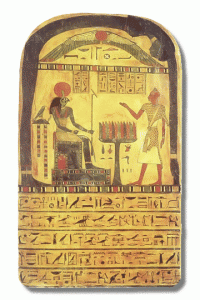The following notes on Thelemic theology are based primarily on the writings of Aleister Crowley. These notes are not intended as interpretation or commentary on The Book of the Law outside the bounds of the Prophet’s writings, nor do they represent a definitive statement of Thelemic belief.

The theology of Thelema postulates all manifested existence arising from the interaction of two cosmic principles: the infinitely extended, all-pervading Space-Time Continuum; and the atomic, individually expressed Principle of Life and Wisdom. The interplay of these Principles gives rise to the Principle of Consciousness which governs existence. In the Book of the Law, the divine Principles are personified by a trinity of ancient Egyptian Divinities: Nuit, the Goddess of Infinite Space; Hadit, the Winged Serpent of Light; and Ra-Hoor-Khuit (Horus), the Solar, Hawk-Headed Lord of the Cosmos.
The Thelemic theological system utilizes the divinities of various cultures and religions as personifications of specific divine, archetypal and cosmic forces. Thelemic doctrine holds that all the diverse religions of Humanity are grounded in universal truths; and the study of comparative religion is an important discipline for many Thelemites.
With respect to concepts of the individual soul, Thelema follows traditional Hermeticism in the doctrine that each person possesses a soul or “Body of Light” which is arranged in “layers” or “sheaths” surrounding the physical body. Each individual is also considered to have his or her own personal “Augoeides” or “Holy Guardian Angel”; which can be considered both as the “higher self” and as a separate, sentient, divine being. With respect to concepts of the afterlife, life itself is considered as a continuum, with death an integral part of the whole. Mortal life dies in order that mortal life may continue. The Augoeides, however, is immortal and not subject to life or death.
Parallel to Buddhist doctrine, the Body of Light is considered to be subject to metempsychosis, or reincarnation, after the death of the body. The Body of Light is generally considered to evolve in wisdom, consciousness and spiritual power through cycles of metempsychosis for those individuals who dedicate their lives to spiritual advancement; to the point that its fate after death may ultimately be determined by the Will of the individual.
Thelema incorporates the idea of the cyclic evolution of Cultural Consciousness as well as of Personal Consciousness. History is considered to be divided into a series of “Æons”, each with its own dominant concept of divinity and its own “formula” of redemption and advancement. The current Æon is termed the Æon of Horus. The previous Æon was that of Osiris, and previous to that was the Æon of Isis. The neolithic Æon of Isis is considered to have been dominated by the Maternal idea of divinity, and its formula involved devotion to Mother Earth in return for the nourishment and shelter She provided. The Classical/Medieval Æon of Osiris is considered to have been dominated by the Paternal Principle, and its formula was that of self-sacrifice and submission to the Father God. The modern Æon of Horus is considered to be dominated by the Principle of the Child, the sovereign individual; and its formula is that of growth, in consciousness and love, toward self-realization.
According to Thelemic doctrine, the expression of Divine Law in the Æon of Horus is “Do what thou wilt”. This “Law of Thelema”, as it is called, is not to be interpreted as a license to indulge every passing whim, but rather as the divine mandate to discover one’s True Will or true purpose in life, and to accomplish it; leaving others to do the same in their own unique ways. The “acceptance” of the Law of Thelema is what defines a Thelemite; and the discovery and accomplishment of the True Will is the fundamental concern of all Thelemites. Achieving the “Knowledge and Conversation of the Holy Guardian Angel” is considered an integral part of this process. The methods and practices to be employed in this process are numerous and varied; and are grouped together under the generalized term “Magick”.
Not every Thelemite utilizes all the practices available, there is considerable room for each individual practitioner to choose practices which are suitable to his or her individual needs. Some of these practices are the same as, or similar to, the practices advocated by many of the great religions of the past and present; such as prayer, meditation, study of religious texts (those of Thelema and of other religions as well), chanting, symbolic and initiatory ritual, devotional exercises, self-discipline, etc. However, some of our practices have been traditionally associated with what has generally been known as “occultism”; i.e., astrology, divination, numerology, yoga, tantric alchemy, and discourse with “angels” or “spirits” are all taken by Thelemites as potentially effective means for obtaining spiritual insights into the nature of one’s being and one’s place in the universe; and for the fulfillment of such insights through harmonious, evolutionary works.
Thelema considers any action which is not directed toward the discovery and accomplishment of the True Will to be “black magic”. This includes acts of interference with any other individual’s lawful exercise of their right to discover and accomplish their own True Will. Thelemic doctrine holds that the disharmony and imbalance created by such actions results in a compensatory, equilibrating response from the universe; a doctrine similar to that of the Eastern conception of “Karma”. Thelema has no direct parallel to the Judaeo-Christian concept of the devil or Satan; however, a pseudo-personification of confusion, distraction, illusion and egotistical ignorance is referred to by the name “Choronzon”.
